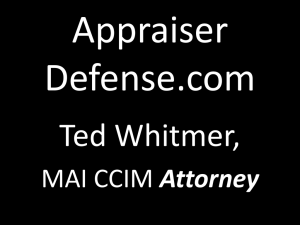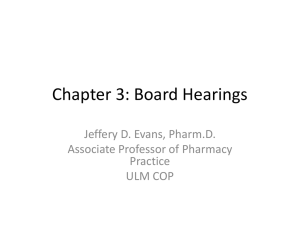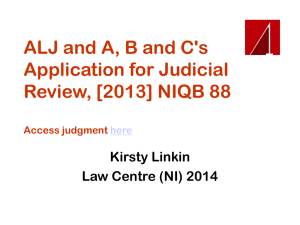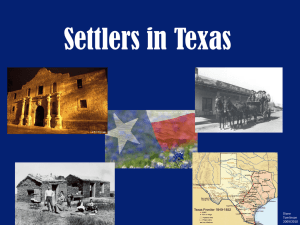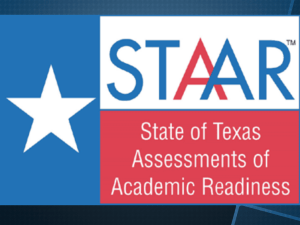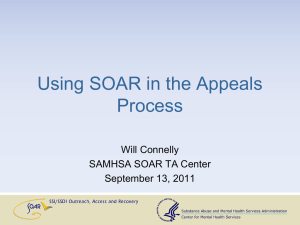State_Office_of_Administrative_Hearings
advertisement
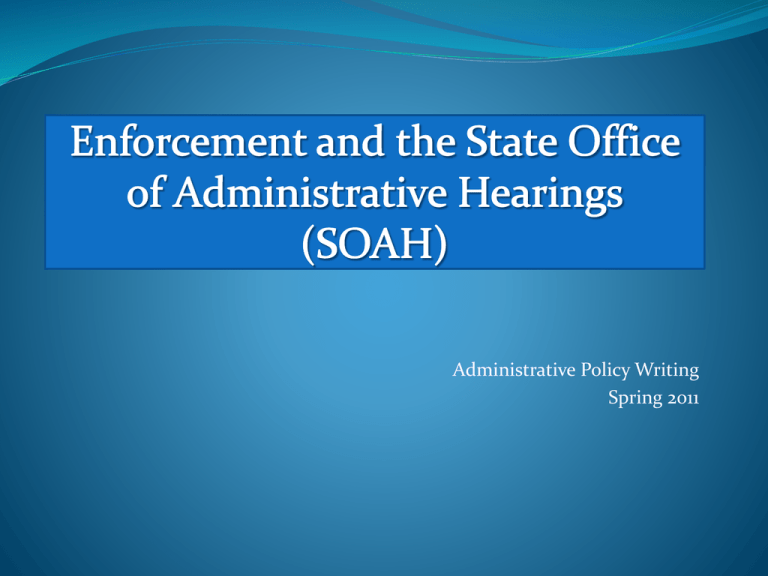
Administrative Policy Writing Spring 2011 Administrative Policy Writing Spring 2011 Introduction An important component of administrative policy writing occurs within the context of enforcement actions initiated by state agencies. After all, as part of the executive branch of the state government, enforcing, or executing, the law is the primary job of these agencies. Today we are going to talk about the policies used by the state to enforce the law and the kinds of written documents produced. You will not be tested on the details we cover, but I want you to be generally familiar with the processes behind written documents that deal with executing the law. Administrative Policy Writing Spring 2011 Review State agencies are charged with implementing or executing a law or some provision of the state constitution. They do this mainly by adopting rules and enforcing those rules and statutes. Sometimes state agencies are called the “Fourth Branch of Government” because, in order to enforce the law, they exercise some quasi-legislative and quasi-judicial powers. Remember, quasi means “having some resemblance.” Today we will see why the “quasi” part is important. Administrative Policy Writing Spring 2011 Review In order to enforce the law, state agencies have The power to issue permits or licenses (and power to revoke them). The power to issue orders. The power to assess fines and penalties for violating the rules and the underlying act. Making a decision to revoke a permit or assess a fine against someone is a quasi-judicial action: like a court rendering a verdict against you. But state agencies are not courts (remember separation of powers). Thus, we call it “quasi.” Today, we are talking about these actions. Administrative Policy Writing Spring 2011 How should the state decide? The concern in these adjudications is how to make them fair and consistent with our American value of due process. Guaranteed by the 5th and 14th amendments to the U.S. Constitution and Article 1 of the Texas Constitution. Due process means that the government cannot arbitrarily take actions that affect your rights without some avenue for you to present your side. And procedures to ensure a fair and rational decision is rendered. We take this for granted. Thus, it is hard to appreciate. Begin today by asking: what would state action look like in the absence of due process? Administrative Policy Writing Spring 2011 Kingdom of Xanadu In the hypothetical kingdom of Xanadu, the people are subjects of an emperor. The emperor has a staff of ministers who oversee the day-to-day workings of government. There are hundreds of ministers who regulate all the sorts of fields one would expect in a modern, industrial society. Doctors and teachers have to be licensed. There are detailed regulations on handling toxic waste. And so forth … It is a very wealthy and sophisticated society. People are healthy. The air is clean. But there is a certain lack of justice. Administrative Policy Writing Spring 2011 Kingdom of Xanadu The emperor is absolute in his rule. Subjects cannot challenge his decisions. Thus, when the minister of medicine thinks a doctor has violated the rules on medical practice, he can take away the doctor’s license. He can do so by simply informing the doctor that his license has been cancelled. The decision is made behind closed doors. There are no public hearings and no appeals. Thus, the doctor has no recourse against a far-off government minister who has just taken away his livelihood. The minister is unaccountable in his actions and may penalize doctors for good cause or no cause at all. Administrative Policy Writing Spring 2011 Kingdom of Xanadu This is a society ruled by the emperor and his ministers, not laws. And individuals have no security that their rights are at all secure. The kind of society the founders of this country (and this state) wanted to avoid. Thank goodness we don’t live in Xanadu? But how do we order our own regulatory bodies to preserve individual freedom? And, at the same time, allow the state to enforce the law to protect the public? Administrative Policy Writing Spring 2011 Due Process The law requires that state agencies follow set procedures for many of their decisions that affect individual rights. These are called “contested cases.” They require a trial-like hearing in which the affected person has the opportunity to appear and present their side. And the decision-maker has to explain his or her conclusions. Important: we are not talking about enforcement of criminal laws handled by the criminal justice system. We are talking about agency decisions that mainly regulate industries and professions. The state also enforces the criminal law in our criminal courts where due process is also required. But this is not a class on criminal justice. Administrative Policy Writing Spring 2011 SOAH Many of these agency hearings are held at the State Office of Administrative Hearings here in Austin. The State Office of Administrative Hearings (SOAH) was created in 1991 as an independent agency to manage and conduct agency hearings for most licensing agencies and other state agencies. In other words, SOAH is like a court system for state agencies where contested case hearings are treated like civil trials: evidence, attorneys, and witnesses. A hearing at SOAH is presided over by an Administrative Law Judge (ALJ). There is no jury. Administrative Policy Writing Spring 2011 SOAH The state agency is represented by their own attorneys or by an Assistant Attorney General who works for the Texas Attorney General. The individual whose license or other matter is at issue is called the respondent. (They are not a defendant because these are not trials in court. You’re only a defendant in court.) Respondents are often represented by an attorney as well. But often not. When individuals appear at a hearing without an attorney, they are appearing pro se. Administrative Policy Writing Spring 2011 SOAH SOAH conducts hearings for approximately 60 state agencies: Public Utility Commission Texas Commission on Environmental Quality Texas Alcoholic Beverage Commission Texas Medical Board Texas Board of Chiropractic Examiners Texas Board of Dental Examiners Others … Administrative Policy Writing Spring 2011 SOAH The state agency will initiate a case at SOAH. The state agency files a complaint and sends a notice of hearing to the respondent. The complaint details the facts and rules or statutes it believes the respondent violated. The notice of hearing will notify the respondent of the date and time the matter will be heard by the ALJ. Many of these hearings are conducted in Austin at SOAH headquarters. But some are done throughout the state. Administrative Policy Writing Spring 2011 SOAH On the day of the hearing, the attorney for the state and the respondent and his or her attorney will be present. Each side will have the opportunity to examine witnesses and put on evidence for the ALJ to consider. After the hearing, the ALJ will make a written decision. That decision is called a Proposal for Decision. PFD Respondent Background and findings Administrative Policy Writing Spring 2011 SOAH Why is it just a “proposal?” Because the state agency, not the ALJ, ultimately decides the case. Odd? (Remember, this is quasi-judicial.) The proposal for decision is then sent to the agency where the agency heads decide whether they agree with the ALJ’s proposed conclusions. They can adopt the ALJ’s findings or send it back to the ALJ for reconsideration. But they are limited in how much they can change the ALJ’s findings. Administrative Policy Writing Spring 2011 Agency Order The state agency will either adopt modify the ALJ’s decision in a documented called an agency order. An agency order is like a verdict. It is a decision that affects a particular person or situation. An order may include a variety of actions: It may impose fines on the individual It may revoke or suspend a license It may censure the individual It may require the individual to perform certain action Administrative Policy Writing Spring 2011 Agency Order Example: An order issued by the TCEQ may require an individual who has illegally dumped hazardous waste to clean up the waste and impose a penalty. Example: An order issued by the Medical Board may suspend a physician’s license. The respondent is the person who is subject to this order To ensure that the order is made on a rational basis and complies with the law, it must specify Findings of Fact and Conclusions of Law An order of the Texas Commission on Environmental Quality This respondent is a nurse accused of violating standards of the Nursing Board Administrative Policy Writing Spring 2011 What happens after an order? In our discussion of state agencies, we talked about the checks and balances imposed on their decisions. In Texas, the judicial branch acts as a check on agency (executive branch) adjudications. In other words, the courts review the decisions made at SOAH. Thus, the SOAH hearing is not the final word on the matter. Administrative Policy Writing Spring 2011 What happens after an order? Texas courts decide whether agency decisions were rational, based upon evidence, and within the agency’s authority. And whether they violated individual rights. If the respondent thinks that the agency violated his or her rights, acted outside its authority, or ignored the evidence presented at SOAH, that person can appeal the decision in state court. Administrative Policy Writing Spring 2011 What happens after an order? At this point, the matter becomes a civil lawsuit. Appealable all the way up to the Texas Supreme Court or U.S. Supreme Court. The respondent at SOAH is now the plaintiff in court. The agency is represented by the Texas Attorney General and is now the defendant in court. The plaintiff may represent him or herself or have an attorney. Administrative Policy Writing Spring 2011 What happens after an order? The other side of the coin: If the respondent fails to perform what an agency order requires, the state can also go to court to enforce the order. The agency must go to court because only a judge can force someone to comply with the law. Separation of powers: the executive branch cannot act like a judge who renders legally binding verdicts. Administrative Policy Writing Spring 2011 What happens after an order? Example: An environmental matter: Suppose an individual has dumped 100 tons of medical waste in an empty lot they own without the proper permits required by environmental laws. After a contested case at SOAH, the TCEQ issues an order that requires the person to clean up the waste. If that person fails to clean up the waste, the TCEQ can request the Attorney General to file a lawsuit to enforce the order. After a trial, that person will be subject to a court order to clean up the waste. Administrative Policy Writing Spring 2011 What happens after an order? Example: A professional matter: Suppose a physician has refused to treat patients who have come to him needing urgent medical care in violation of the Medical Board’s rules. After a contested case hearing at SOAH, the Medical Board issues an order suspending the physician’s license for six months. If that physician does not appeal that order and fails to stop practicing, the Medical Board can request the Attorney General to file a lawsuit to enforce that order. After trial, the physician will be subject to a court order to cease practicing medicine until the suspension is over. Administrative Policy Writing Spring 2011 What about the federal government? Thus far, we have been talking about how Texas agencies enforce the laws. The federal government has a similar process in place. When a federal agency wants to take some (non-criminal) action against someone that affects their rights, it has a similar administrative hearing process. Administrative Policy Writing Spring 2011 What about the federal government? If you have ever heard people talk about a “social security judge” or “immigration judge,” these are federal ALJs. When the government seeks to take away someone’s social security benefits or deport someone, it is an agency decision made by a federal ALJ. These agency decisions can be appealed in federal courts. Unlike Texas, there is no centralized hearing system. Federal agencies have their own hearings with their own ALJs. Administrative Policy Writing Spring 2011 Administrative Policy Writing Spring 2011 What is a SOAH hearing like? A SOAH hearing is a primary way to see the executive branch of our state government in action. These hearings feel like a trial, but are usually less formal. You will see an ALJ in the front of the room. The state’s attorney and the respondent will sit facing the ALJ. Like trials, SOAH hearings are open to the public. Extra Credit! Attend a SOAH hearing and write a response paper on what you observed. See the assignment sheet at the course web site.
